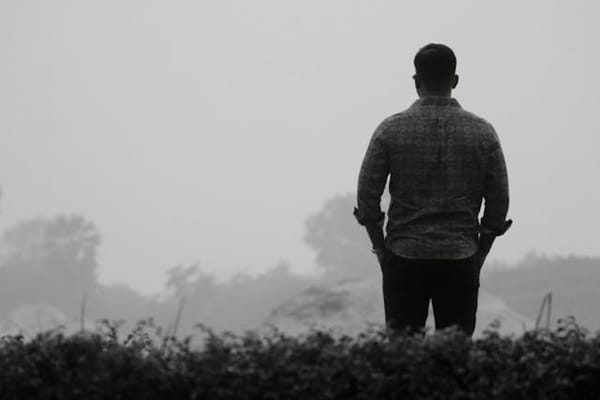Small Steps
Thoughts on the long road to goodness, by Jude.
This post was originally published on May 18, 2025.
Strive first to be good, then to do good. “Doing good” without being good causes more harm than good.
A little phrase like this might play well on your social media feed or inspire you to pause for a mindful moment, but “striving to be good” is not as easy as it sounds. In just one explanation of what “goodness” is, Jesus tells us to love our enemies. But that's a pretty tall order. Sometimes we don’t even get along with our families. Where do you even begin?
As with most things, begin with small steps. Those steps might not make you a good person by the end of the week, but with every attempt you can move your mind, soul, and heart in the right direction. You can even begin right from the driver’s seat of your car.
Driving as practice.
I used to be an angry driver. Never crossed into complete road rage, but I have dipped my toes in it. I've pounded the steering wheel, practiced my English invective, spouted epithets, and growled like an animal, each time arriving at my destination good and pissed.
Once on a trip to Rocky Mountain National Park, after hours spent relaxing in breathtaking natural beauty, I tailgated someone down a twisty mountain road leaving Estes Park, Colorado, simmering and swearing the whole way down. They drove so slow. After what seemed like an eternity, we reached level ground, the road split into two lanes, and without a thought I blew past them, reaching 70 mph in a 35 zone, making sure to get their attention and yell at them as I flew by.
For the record, karma is a thing. Two cars behind me in the long line coming down the mountain drove a police cruiser. They saw everything.
It's very different now. I keep to the speed limit (plus or minus 5, of course). I leave plenty of space. I anticipate people's bad decisions. And I would take a slow speed down a twisty mountain road as a blessing.
That change started soon after I arrived in San Diego. At some point while making my daily commute up and down Interstate 805 – which is eight lanes of pure madness – I noticed the irony of me listening to a Buddhist dharma podcast while screaming at a stupid jerk to put on his bloody turn signal.
This particular episode was a loving kindness meditation where the teacher, Gil Fronsdal, talked about how to focus on a particular person while silently repeating four phrases: “May you be happy. May you be safe. May you be healthy. May you be peaceful.”
One day I just started saying those phrases to the drivers who otherwise would have been the subject of my fury. When someone cut across three lanes of traffic less than one car length away, I said out loud, “May you be happy.” When a wall of cars would not let me merge, I declared, “May you be safe.” When someone roared past, nearly blowing my doors off, “May you be healthy.” And when someone sent me their ire in a multitude of forms, “May you be peaceful.”
I'll be honest: it was not a natural fit. There was harsh dissonance between the razor blades and bile pulsing in my body and the butterflies and rainbows coming out of my mouth. Maybe the first few times it was more like, “May you be happy, you idiot!” However, over about six months of practicing like this twice a day on a drive that gave so many opportunities, I became calm even when witnessing some incredible carelessness and outright absurdity.
I saw other drivers for their humanity, our collective weakness and fragility. I realized that we are all conscious blobs hurtling ourselves at 70 mph near other solid objects, ignorant of the force of potential impact on our squishy and brittle bodies, lulled by the illusion of invulnerability encased in two thousand pounds of private steel bubble. I saw us as drops falling in the same cascade, and soon enough I meant what I said: “May you be happy. May you be safe.” And, strangest of all, I saw fewer jerks. I saw instead people just trying to get where they went in the only way they knew how.
I felt calm, and surprisingly I also felt compassion. Because I was one of them, cosplaying calm-Buddhist-guy while disguising angry-road-rage-guy. This practice created conditions that nourished compassion and starved anger. The anger still burned, but for those moments it did not escape into the world through me.
Over time, I saw how, in so many ways, the causes and conditions around us create who we are. We always have the option to create different conditions, but most times we can't see that as an option. So, unless we decide to change our intention, we continue to nurture road-rage-guy by default.
Practicing in this simple way opens a window through which we can peek at what it means to love our enemy. It can be done any time, in any place.
Loving our enemy does not mean inviting them over for dinner.
A practice like loving kindness meditation is one way we can learn to live up to the Bible teaching to love our enemies. But this is an important point: Loving your enemy does not mean you need to bring them into your life. Loving your enemy means you choose to wish them well and no longer carry the burden of hating them. You can work in opposition, especially if they're doing bad things. Through simple practices like loving kindness, over time you see it is possible to oppose without hatred.
On top of that, “love your enemies” is not another way of saying, “Can't we all just get along?” Some views are so out of bounds we cannot – rooted in our principles of truth, dignity, and unity – give them any credence. In the same way one’s right to swing their fist stops at my nose, their right to speak hate and lies stops at my ears. Stalinist, fascist, racist, exploitative and extractive capitalist – those views that place power over truth and profit over dignity are not “different perspectives” to consider. They are poison we should not allow into our minds.
Even for people who hold those views, we can wish them happiness, safety, health, and peace. And at the same time, we must do the work to oppose them, and do it without hatred. But they will need to do their part before there can be any meaningful conversation.
It’s ok to say, “May you be happy. May you be safe. Now please leave.”
Have a question or any feedback? Please leave a comment - I'd love to hear from you!





